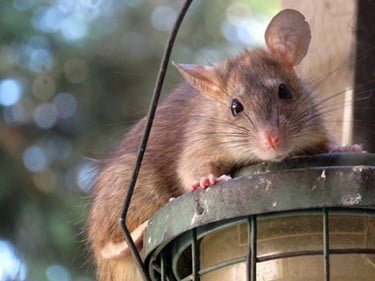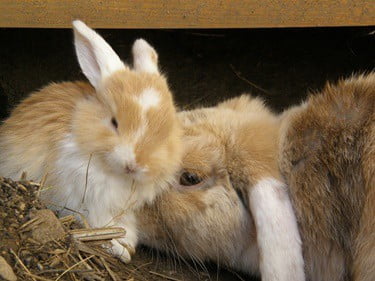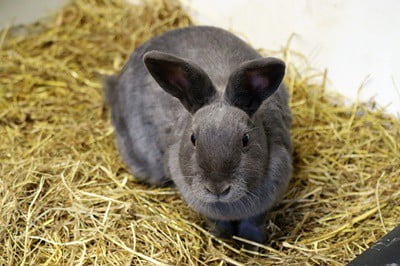Many owners find that their rabbits attract rats and mice. Not only is it unpleasant to have vermin in your home or yard, but it’s also a health hazard. Rats have also been known to attack smaller rabbits and kill kits.
Pet rabbits attract rodents due to their food. Mice and rats will sniff out rabbit food, and once they find a steady source of food you’ll be hard-pressed to get rid of them. Rats will also eat rabbit droppings for extra nutrients. Rodent-proofing the hutch and regular, thorough cleaning of leftover food, soiled bedding, and droppings will deter rats and mice. Rabbit food and bedding must also be stored in air-tight containers.
Rats and mice are carriers of disease, including salmonella and hantavirus. These diseases and bacterial infections can be transferred to the rabbit through bites, and also through contaminated droppings and urine.
Do Rats Attack Rabbits?
Wild rats have been known to attack rabbits. Usually, only small rabbits are those that are attacked outright. Large rabbits aren’t considered a potential food item, and thus are rarely attacked without provocation. That said, if a doe attempts to protect her young from the rat, it may attack the rabbit in an attempt to escape.
Whether a rat will attack a rabbit also depends on how desperate the rat is for food and the temperament of the rabbit. Rats will sneak into a rabbit’s enclosure and steal leftover rabbit food, and slip away without trouble. Rabbits are quite docile, and won’t be bothered by the rat eating its food. However, a territorial rabbit may try to scare the rat off, resulting in a fight.
Most animals would rather flee than fight. Every situation is different though, and rats will defend themselves if needed.
Does Rabbit Poop Attract Rats?
Rats practice coprophagy, which is the habit of eating excrement. This allows the rats to salvage any nutrients that were not absorbed during digestion the first time around.
Rabbits, especially domestic rabbits, are fed high quality food on a regular basis. Thus, as gross as it may seem, the droppings of these rabbits are also of a higher quality, making it tempting for a rat to eat.
Naturally, a rat will go for droppings left by a healthy animals on a good diet. Its fine sense of smell allows it to find these droppings, especially if the enclosure isn’t cleaned as often as it should be.
Not cleaning your rabbit’s droppings up properly or frequently, or not disposing of them accordingly, can attract rabbits to your property.

Can Rats Harm Rabbits?
Rats attack by biting and scratching. These acts can cause significant damage to a rabbit, especially if the rabbit is:
- Bitten on the throat or face
- Small enough to be overpowered by the rat
A rat’s teeth are powerful. Although these rodents are small, rats have incredible bite strength and tough teeth. Rats are even capable of chewing through metal and concrete. Knowing this, the fur, skin, and muscle of a rabbit will hardly protect it from a rat’s bite.
Rats can harm rabbits. At times, severely enough that a trip to the vet will be needed. All rats are also potential carriers of disease, two of which can be transferred via bites and scratches.
Rat Bite Fever
As stated in American Society for Microbiology, rat bite fever is caused by Streptobacillus moniliformis. This bacteria is transferred through bites and scratches and carries a 10% mortality rate if left untreated.
Rat bite fever usually presents itself as a fever, with rigors and polyarthralgias following. Due to difficulties in discovering the root of the initial symptoms and developing cultures, it is somewhat difficult to diagnose an initial onset of rat bite fever.
Rabbits bitten by a rat should be taken to a vet. Not only to treat the wound, but to take preventative measures in case of infection. A precautionary treatment course may be prescribed.
Salmonella
Everyone is familiar with salmonella and the importance of cooking chicken thoroughly. Rats, however, are also common carriers of salmonella bacteria, and can spread it via excretions. The American Journal of Public Health Nations Health notes that infected rat excretions have been responsible for salmonella food poisoning outbreaks.
An infected rat can leave droppings or traces of the bacteria in a rabbit’s enclosure, leading to contaminated food and water. Should the rabbit ingest either, it can become fatally ill. The rabbit can also be infected if the rat bites or scratches it.
Other Diseases
There are two other bacterial diseases that rats can pass onto rabbits by contaminated excretions: hantavirus and leptospirosis. Contaminated rat droppings can pass the bacteria responsible for both conditions onto the rabbit.
Leptospirosis, or Weil’s disease, can also infect water supplies if contaminated by rat urine. Symptoms of this disease include:
- Fever
- Diarrhea
- Loss of appetite
- Weakness
- Muscle pain
In severe cases, leptospirosis can infect individual organs. A lack of treatment can lead to organ failure and death. Hantavirus can also cause death via respiratory failure and is contracted through exposure to contaminated rat droppings.
Will Rats Eat Baby Rabbits?
Rats are opportunistic and voracious when it comes to food. Sadly, rats have been known to sneak into rabbit enclosures and carry off rabbit kits. The rat may pick the kit up by the scruff and carry it away somewhere safe, where it will kill and devour the helpless young. There are many stories where rabbit owners report this very thing happening, or discovering the gruesome aftermath.
A rat can easily overpower and kill baby rabbits. Once a rat discovers an easy food source, such as a rabbit hutch with food and kit litters, it will remain close. Rats are notorious for being hard to get rid of for this reason.
Do Rabbits Deter Rats?
Rabbits won’t deter rats in the slightest. Larger rabbits may make a rat hesitate to attack it, but it will not scare the rat away.
Do Rabbits Attract Mice?
A rabbit itself does not attract mice. A rabbit’s food and droppings are what attract mice. Mice have an amazing sense of smell and will be able to sniff out potential meals with ease. Much like rats, if a mouse finds a reliable food source it will make itself quite at home.
Larger rabbit hutches are also a potential home for a mouse. The enclosures are secure enough that most predators are kept out, the bedding provides insulation against the cold, and there is always food and water available. As far as nesting sites go, this is as good as it gets for mice.
Are Mice Afraid of Rabbits?
Mice are small prey animals. Anything larger than a mouse is likely going to elicit a flee response. Rabbits are hardly aggressive animals though, and will likely be unbothered by a mouse sharing its enclosure on occasion.
A mouse may be startled if the rabbit moves suddenly or tries to approach. Over time, a mouse may learn that the rabbit is not a threat. Meaning that it will largely be unbothered by the rabbit’s presence, even if it approaches.
Are Mice Dangerous to Rabbits?
Unlike rats, mice will not attack rabbits. We couldn’t find any cases of mice attacking baby rabbits either.
Mice, however, are carriers of disease and parasites. This includes fleas, mites, and ticks, which can infest the rabbit’s enclosure and the rabbit itself. Parasites themselves can be carriers for bacteria and viruses, including internal parasites.
Much like rats, mice can carry hantavirus and salmonella and contaminate enclosures with droppings. Even worse, dry mouse droppings crumble into dust. This dust can still contain live hantavirus cultures, and can be inhaled by both rabbits and humans.
Mice are also known to carry lymphocytic choriomeningitis, which is a dangerous viral infection. Untreated, it causes inflammation around the brain and spinal cord. Rabbits can be infected through exposure to fresh mouse droppings, urine, saliva, or nesting material.
Keeping Mice and Rats Out of Rabbit Hutches
There are ways to minimize your rabbit’s interaction with rodents. We have grouped these measures into three categories: rodent-proofing the enclosure, making your home and yard undesirable to rodents, and preventative maintenance.
Each of the measures below are important steps in keeping rodents away, or at least keeping the little critters out of the rabbit’s hutch.
Rodent-Proofing The Enclosure
Mice and rats are known for squeezing through the smallest holes and cracks. Either invest in a rodent-proof rabbit enclosure, or make some adjustments to your current hutch. Ensure that any mesh walls are made with 0.5 inch chicken wire, as this prevents any rodents from slipping through the mesh.
As for the hutch itself, ensure that the floor is solid. This prevents droppings from falling to the ground and being mushed in, thus making it harder to clean up. Solid floors also have the benefit of preventing sore hocks.
If you notice any damage to the enclosure from the outside, it may be rodents attempting to gnaw their way inside. This is a big sign that additional steps must be taken to deterring them. Be sure that the enclosure is secure, and that any holes are thoroughly patched up.
An anti-rodent enclosure is highly important if your rabbit has, or is about to, have kits. Rats will actively hunt these defenseless kits once aware of their presence.
Making Your Yard Undesirable To Rodents
For those having difficulties keeping rodents away from the rabbit’s enclosure, look into pest control options. This could include traps, sonic devices (which may also affect the rabbit, so be careful), and other anti-rodent pest control measures.
Be aware that some of these anti-rodent measures can also harm, if not kill, your rabbit. Take caution, and consult with a vet and pest removal agency about what might work best for you.
Trapping Rodents
Those squeamish about poisons or bait traps can always purchase humane traps. These allow rodents to be safely trapped and relocated, all without the use of poisons or painful mechanisms. For the welfare of the animal, it is important to either check the traps 1-2 times a day, or ensure there is bedding, water, and food within the trap.
The rodents trapped should either be relocated or taken to a vet clinic for humane euthanasia. Check with the clinic beforehand if they are willing to do this procedure.
Hatch and Enclosure Placement
Rats and mice love making nests in dark, sheltered places. Especially those that are warm and near food. If your rabbit’s hutch has any small spaces or cavities, a rodent may decide that this is the perfect place to set up shop.
Push the enclosure either flush to the wall, or move it at least three feet away from any walls or any other possible hidey holes a rodent might use.
Also consider where else on your property that a rodent might live. Are there any junk piles or unturned compost heaps? Perhaps piles of wood or shrubs that have grown out of control? Rodents will consider all of these places as a viable place to call home. A pest control expert will be able to quickly identify problem areas on your property.
Preventative Maintenance
There are two main avenues towards deterring rodents from returning, or arriving in the first place. Properly storing food, and ensuring that the hutch and enclosure are cleaned properly. A rodent’s acute sense of smell will lead it to a potential meal, meaning that preventative maintenance is your best friend for keeping rodents away.
Food Storage
Many owners buy food and nesting material in bulk, as it is more cost-effective. However, storing these items attracts rodents. This is especially true if they are stored in a cool dark place easily accessible to rodents, like a shed or garage. Over time, rats and mice will be attracted to these scents. These items, too, are usually stored in material containers that rodents can easily chew through.
The abundance of food will encourage the rodents to stay. The same can be said for nesting material, like hay. This provides insulation and protection, which is ideal nest building material for any rodent. Ensure that all food is stored in air-tight containers and kept where rodents cannot access it.
It is also good to place the food dish in the enclosure away from the mesh walls. This way, rodents can’t reach through the wire and steal a few morsels.

Cleaning Enclosures
Rodents will feast on rabbit droppings, remember. Not only is regular and thorough cleaning of the hutch and enclosure vital for the health of your rabbit, it keeps rodents away.
Ensure that the hutch is cleaned properly. Including changing out any hay, or other substrates, cleaning up droppings, and removing leftover food. Confirm that all old food and soiled items are disposed of properly.
These items don’t have to be in the enclosure to attract a rodent. A rodent will tear its way through rubbish bags easily.
As for food dishes, it may also be an idea to empty the food dishes at night. This is when rodents are naturally more active. If a rodent cannot easily find food any longer, it may move on to another location.
Will Rabbits Attack Rodents?
Rabbits are not known for being aggressive. However, a rabbit may act this way if it feels threatened and trapped, is defending its territory, or is protecting its young.
Soft and cuddly as a rabbit looks, it can still defend itself where needed! It may bite, scratch, or kick at any rodents intruding on its territory. Mice and small rats may even be killed, although it is not a likely scenario.
Pet rabbits attract both mice and rats. Rodents have an impressive sense of smell, and will be able to seek out rabbit enclosures easily. Rodents will scavenge food either from the enclosure, if able to get inside, or from storage. Rats will also eat rabbit droppings.
Keeping rodents away from your pet rabbit involves rigorously cleaning the enclosure and hutch of droppings, food, and soiled bedding. It also will involve proper, air-tight storage of all rabbit food and bedding.
Ensuring that the hutch and enclosure are both rodent-proof will also prevent rodents from being able to eat droppings and food, thus dissuading the rodents from settling in permanently.

